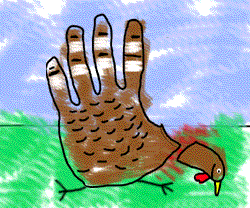For someone coming from outer space, similarities between the U.S and France, at first sight, would probably prevail over differences: both countries are to be counted among the luckiest on earth, meaning the ones with a true –but, of course, imperfect- democracy; with a very enviable GDP, with some (angry) bike commuters; with a permanent seat at the U.N security council; with a government
generally composed of fiftyish white men wearing dark-colored suits and the occasional running shorts (usually at the beginning of their term); with some record of excellence in several sports (basketball here, soccer there-did I hear someone snorting?! Wait for the next World Cup, you’ll see!); with a high literacy rate, with a
compassionate health care system…(oops, almost forgot to strike this one out…)
Of course, a person from outer space with his/her incredible brain would quickly notice that we certainly don’t speak the same way and, more importantly, that we don’t eat the same way. But he /she would probably not be instantly aware of all the “petites” differences, extravagances that make our countries so deeply alien to each other. Like the one ( I have a very long list that I intend to explore in this blog) concerning the seasons. Just consider the fall season: here, in the U.S, most people get excited by the start of the new season of their beloved TV series, and more can’t wait for the start of the new (American) football season. It is almost impossible, for someone owning a TV and/or a radio, to escape any of them. Ads overflow magazines’ and newspapers’ pages. In France, people certainly do get also excited by the start of new TV shows and by the succession of strikes/demonstrations that also pertain to the fall season. But in France, the season that resonates as much as the football season here is…the literary prizes season, la rentrée littéraire. As some of you might already know, France, since it s first piece of literature written in 880 (La sequence de Sainte Eulalie, written in roman language), has always had a love affair with its literature and its authors. And still has. To the point that any celebrity (be it a politician, a TV anchorwoman, a soccer player –yes, even a soccer player-, an actor and so on…), when sufficiently connected, will publish a novel. It is the ultimate way to prove to yourself and to the world that indeed, you are someone, “ Un honnete homme”.
No wonder, then, that the season in which literary prizes are awarded is of such importance. Any respectable newspaper, magazine, TV show have to talk about it, and sometimes as early as mid-August, when about half of the population (the half that was working in July) is still perfecting its tan on the beaches of Saint-Tropez or Sainte-Maxime. Bookstores struggle to find room for both textbooks and the ton of new books being published in September: for, even an avid, glutton reader can easily be swallowed by all these new tiltles waiting to be read. Why publishing so many books at the same time? Because in October-November, the most famous literary prizes for the French-speaking world are awarded, just in time to make it to the gift-list of the holiday’s season.
And the competition is as fierce as on a football field. In fact, curiously, it looks a lot like football. Let me try to explain: there are some teams, the publishing houses; some are well-established, ruthless, jealous of their reputation, ready to crush the unexpected and truly gifted rookie writer unfortunately drafted by the rival team; rumors about this season’s shape of a famous quarterback are let out during the summer (this year, it’s Flammarion’s famous quarterback, Michel Houellebecq, whose condition has been repeatedly said to be excellent, better than ever); and of course, the literary prizes season has its Super Bowl, le Prix Goncourt (1). Normally, you can only receive it once (2), and it is a tremendous honor to be its recipient. Better than the Goncourt, in the literary world, there is only the Academie Francaise and the Nobel Prize of literature. And, for the winning publisher, it’s like winning at the lottery. So it explains why the competition is so fierce.
Bref, for almost three months, all the intellectual France, from the literary sections on high-school to the terraces of the cafe Flore are fluttering. There are the pro-Houellebecq, the pro-Amelie Nothomb (3)and the anti-; the ones that only swear by the name of that unknown genius published by that non-less unknown provincial publishing house (
tu sais, mon cheri, ils publient aussi en province!)(4) Even if they also all know that sometimes, the name of the publishing house is more important than the name of the author…
However, as in a good football season, despite all prognoses, everything can still change during the last game: the jurors of the Prix Goncourt always have lunch (the French-style lunch, lasting at least two hours)(5) in Paris’ famous Drouant restaurant, where they cast their votes as many times as necessary to get a winner. Some jurors change their mind at the last minute or the expected winner is finally beaten by the unknown writer. Or sometimes, it seems that the jury wishes to demonstrate its true independence by awarding the prize to an author who doesn’t belong to the Parisian cenacle (these past few years, the prize has been awarded to a Senegalese writer (6) , an Iranian writer (7) and an American writer (8) ; all writing in French,
cela va de soi. This might not happen this year, since except for one writer (9) , all of them are French or Belgian. But the jury may decide to embrace again the feminism cause and give the Goncourt one more time to a female writer, Virginie Despentes (not likely) or Amelie Nothomb (more likely).
What would our friend from outer space conclude from this? Would he/she prefer to watch every football game of the season or read all the books of the Goncourt’s list? Or would he/she just pack and go home, planning to come back when the season is finally over?!
(1) Le prix Goncourt was named and created by two very literary brothers, les frères Jules et Edmond de Goncourt, who wrote a famous journal in the second half of the XIX century; they were good friends of Maupassant and not so good friends of Zola…
(2) With the exception of Romain Gary, who received it twice: the first time for his novel “Les Racines du Ciel”, in 1956 under his real iterary name and the second time for “La vie devant soi”, in 1975, under the pseudonym of Emile Ajar.
(3) This year in competition for her novel Une forme de vie, published by Albin Michel.
(4) You know, dear, they also have publishing houses in the country! –meaning outside of Paris…
(5) Here is last year menu : terrine de gibier aux truffes et foie gras, crème de marrons à la poule faisane, bar poché au jus iodé de coquillages, tatin de légumes, perdreau gris et pommes au lard, munster, tatin aux coings et glace vanille. Côté vins, champagne blanc de blancs, Puligny Montrachet 2006, Château Rauzan Ségla 2003, Riesling Schlumberger, Tokay Azu 2000. Who wouldn’t want to become a juror, just for the meal?
(6) Marie N’Diaye, for Trois femmes puissantes, 2009.
(7) Atiq Rahimi, for Syngue Sabour, pierre de patience, 2008.
(8) Jonathan Littell, for Les Bienveillantes, 2006.
(9) The Moroccan writer Fouad Laroui, Une annee chez les francais.
 These days –but hasn’t it always been like that? [1]-, when you get news about Haiti, it is always bad news: political unrest, hunger riots, gang violence... Then the earthquake, then the international help so disorganized that almost a year after the earthquake most of the population of Port-au Prince is still living into one of these tent slums…then the cholera and again, political instability. A doomed place, a living hell, that’s what Haiti looks like these days from the outside.
These days –but hasn’t it always been like that? [1]-, when you get news about Haiti, it is always bad news: political unrest, hunger riots, gang violence... Then the earthquake, then the international help so disorganized that almost a year after the earthquake most of the population of Port-au Prince is still living into one of these tent slums…then the cholera and again, political instability. A doomed place, a living hell, that’s what Haiti looks like these days from the outside.  Dany Laferriere is one of these intellectuals forced to live in exile (since 1976). Laferriere lives in Montreal and shares his time between writing articles for local newspapers, writing books and now directing movies. He became famous in the literary world in 1985 with his first provocative novel entitled Comment faire l’amour avec un nègre sans se fatiguer (how to make love with a nigger without getting tired) in which he was exploring the relationships between Whites and Blacks in Montreal and the way they dealt with sexuality. After this one he published more novels, some as provocative as his first one, some reflecting on the questions of identity and exile (themes also present in its first novel).
Dany Laferriere is one of these intellectuals forced to live in exile (since 1976). Laferriere lives in Montreal and shares his time between writing articles for local newspapers, writing books and now directing movies. He became famous in the literary world in 1985 with his first provocative novel entitled Comment faire l’amour avec un nègre sans se fatiguer (how to make love with a nigger without getting tired) in which he was exploring the relationships between Whites and Blacks in Montreal and the way they dealt with sexuality. After this one he published more novels, some as provocative as his first one, some reflecting on the questions of identity and exile (themes also present in its first novel). 









